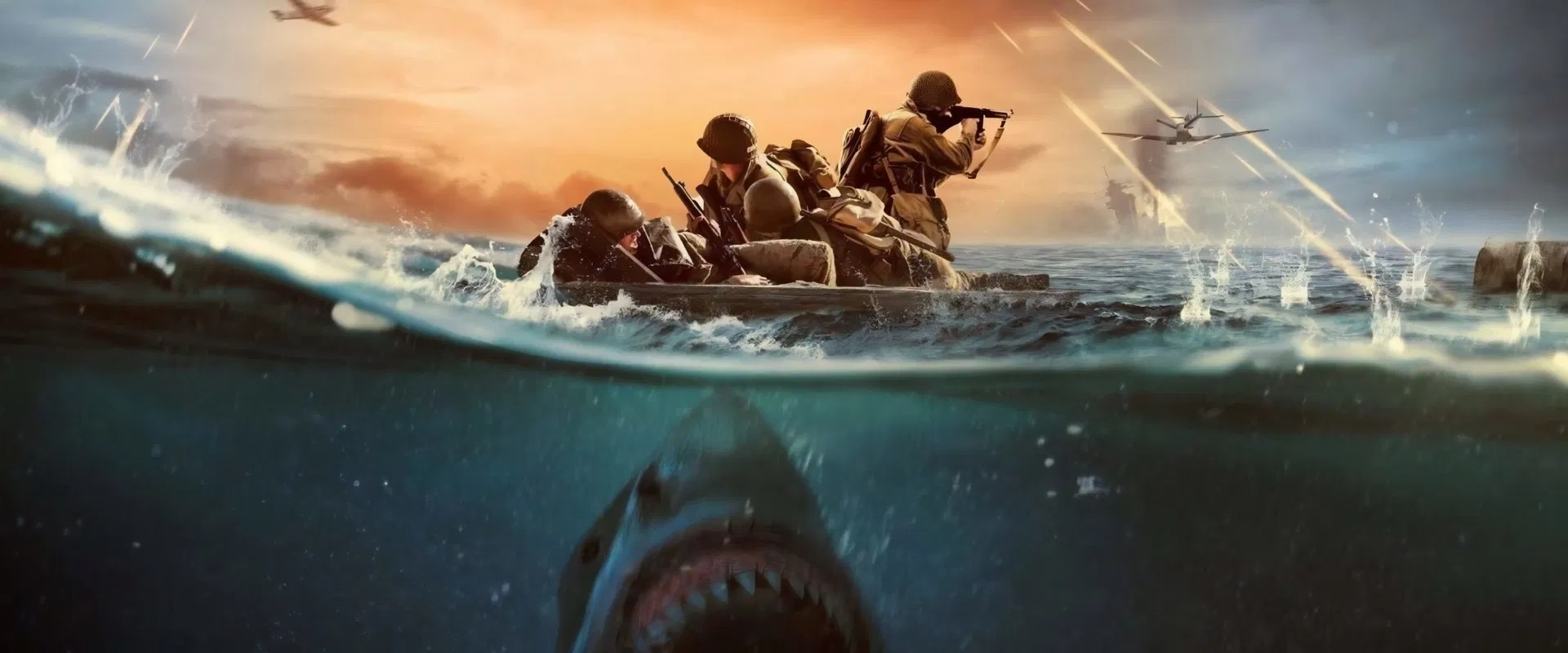There’s a time-honored tradition in cinema, the men-versus-beast saga, that old primal dance where human muscle and nerves are pitted against Nature’s monstrous embodiment. You take a handful of plucky survivors, toss them into a cauldron with a theatrical bloodthirsty menace, and watch them squirm, sweat, and, with luck, reveal the tender, squishy stuff they’re made of. When done well, the air crackles: you’ve got tanned, panicked flesh, gnashing teeth (shark or man, take your pick), and that perfect frisson of horror and black comedy. When done poorly, as in the lamentably misnamed Beast of War, you can practically hear the rubbery props squeak and the actors yawn. The only beast here is monotony, snapping at your ankles.
It’s almost touching, the faith someone must have had in this project, a World War II survival story, a cast of strapping young Australians clinging to a raft in the Timor Sea, all while a plus-sized great white circles beneath, auditioning the menu. “Based on a true story,” we’re told, though, by the time Leo is sipping his own urine and the stormclouds obligingly open, one senses that the only true story at work is cinematic desperation. You could call it Das Boot by way of Sharknado, but then you’d be giving the film a grandeur it never earns.
There are moments, oh, brief, flickering moments where you almost believe this might amount to something. The opening act, for instance, has actual atmosphere: young men, war-addled and shellshocked, pitched into the indifferent blue from the wreckage of a ship. You expect, perhaps, a wartime Lifeboat, that wisdom of Hitchcockian economy where a handful of characters adrift turns into a crucible. But this lifeboat is made of cardboard and soundstage resin; it’s a platform bobbing on the shallow end of a studio tank, and the actors, poor souls, are damned to pantomime the illusion of peril. There is not a spray of brine or sunburnt cheek that couldn't have been purchased at the Halloween aisle.
Then the beast arrives. What a head! The shark prop, let’s not pretend otherwise, this is a film about a prop deserves its own credit. When it’s onscreen, bless it, you glimpse the dilapidated majesty of low-budget effects artisanship. But the camera, in thrall to its rubber idol, bends the entire film to the will of “show the shark.” Characters dangle limbs with all the caution of children told the stove is hot; a parade of idiocy ensures the attrition rate never falls below genre expectations. There is a tragic, unintended hilarity when a soldier, having just witnessed his mate chomped into Timor sushi, promptly decides to cool his heels over the edge. Nature may be red in tooth and claw, but in Beast of War the true predator is Stupidity, and its feast is endless.
How much dramatic tension can you wring from a cast whose finest hour is a scene of competitive piss-drinking? Leo (Mark Coles Smith), giving us the lone spark of invention, sucks down his bodily reserves and inspires a new fad among the blockheaded survivors. “If you can’t outswim the shark, you may as well take a gulp,” seems to be the film’s grim lesson. Five seconds later, the heavens rumble and pour, the cosmic punchline lands. If only divine intervention had struck sooner, to spare the audience.
It’s not simply that Beast of War is derivative. Cinema thrives on the artful recycling of tropes. It’s that it’s so thin, so uninterested in anything beyond its cheap trick. Kiah Roache-Turner’s direction is all dutiful water-logged close-ups and perfunctory plank-walking, but there is no pulse, no sense of dread, no character to care for. “Primitive War,” that genre cousin with WWII and dinosaurs, at least had the decency to give us personality, invention, a shred of narrative playfulness. Here, every opportunity to dig below the surface either into the camaraderie of the damned, or the existential dread of being prey is tossed overboard. There is no sense of history, no wartime stakes, only the grinding repetition of dangle, chomp, scream, repeat.
One aches for an inkling of wit or surprise. Even the “true story” claim drowns in a puddle; what’s true is that men die in war, and sometimes end up in the ocean, but this production can’t be bothered to wrestle truth into drama, or even pulp poetry. Instead, it sits limp, a plastic raft circling itself endlessly, awaiting the mercy bite of the end credits.
Jaws didn’t invent the man-eating shark, but it at least understood how to exploit tension, to make the sea itself a character, the unknown its own trap. Watching Beast of War after Spielberg is rather like watching West Side Story performed by marionettes with tangled strings: the music is gone, and all that’s left is the clacking of joints and a director offstage, desperately tugging.
Beast of War is a lesson in deflation. It promises teeth and delivers only gums, offers the spectacle of survival but none of its poetry or pain. As the cast sits on their floating plywood, staring into the blue screen abyss, you can’t help but envy the shark: at least it gets to leave.


